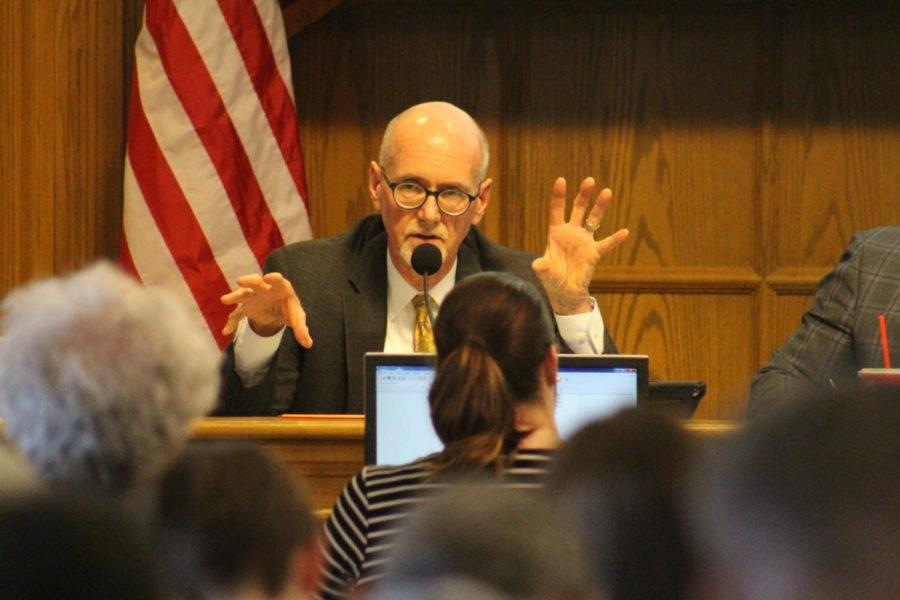City Council repeals rental cap
Mayor John Haila talks about his thoughts on the issue involving the Ames Comprehensive Plan 2040 being discussed during the Ames City Council meeting on April 23.
May 28, 2019
The Ames City Council repealed the Rental Cap Ordinance adopted in Spring 2018. The repeal comes in the wake of recently passed state legislation banning rental caps on single family homes and duplexes. While the city can no longer limit the number of rental properties in certain neighborhoods, occupancy changes made to the municipal code are unaffected by the new bill.
According to municipal code, properties in the “Near Campus Neighborhoods” will remain limited to a number of adult occupants equal to the number of bedrooms the City had on file on January 1, 2018.
The council voted to hold the Healthy Life Center’s bond referendum on September 10. The total bond revenue needed to fund the project amounts to $28,609,448. The referendum will decide if the City of Ames should be authorized to raise funds through the sale of bonds. The location of the ballot is to be determined.
The estimated tax impact for every $100,000 on residential property owners amounts to a $44.13 increase and a $69.74 increase for commercial and industrial property owners. City Manager Steve Schainker was clear about the ongoing risks and costs related to the project and site.
“This is the important number for the citizens,” Schainker said. “We want to be very transparent with not only the cost of the property taxes for the extra capital, but also the ongoing deficit of [$405,000].”
With a mission to make healthy living accessible and enjoyable to people of all ages and socio-economic status, the Healthy Life Center will feature multiple playgrounds and gymnasiums, a walking track, an aquatic center, physical therapy services and more. The first of five informational meetings is set to take place 6 p.m. June 10 in Edwards School.
The council dedicated a significant portion of their meeting to listen to the City Safety Committee’s report on Public and Employee Safety on City Property. The committee was created after the killing of Celia Barquin Arozamena.
In the report, the Ames Police Chief, Charles Cychosz, highlighted a continued need for outreach and service coordination to folks experiencing homelessness in the Ames community.
“Another important area of action for us is a more coordinated effort to reach out to the homeless in our community,” Cychosz said. “We are grateful for our partnership with the Emergency Residence Project … together we have a regular program of outreach in some of the areas where we suspect people may have a camp.”
Mayor John Haila joined in the discussion, inquiring a presumed conflict between private property owners and public outreach.
“There is at least one property owner in town that is actually allowing homeless people to live on the property … how are you [Cychosz] approaching that?” Haila said. “I think we all would agree, and that you [Cychosz] would, too, that this is the big topic and the cause of [Celia Barquín Arozamena]’s murder.”
Haila’s comments were met with a proposed commitment towards the investment in Ames’ homeless population and the expansion of available resources and services.
“We try to make those connections and build that rapport,” Cychosz said. “And in time, get [homeless persons] in safer living conditions.”
The council also heard the Ames Historic Preservation Commission discuss how their aims are growing to embrace increasingly vital sustainability efforts.
Vice Chairperson Ted Grevstad-Nordbrock suggested that it is the role of the Historic Preservation Commission to think more broadly about the field of preservation.
“Building reuse typically offers greater environmental savings than demolition,” Grevstad-Nordbrock said. “The majority of [newly developed] building types across America will take between ten to thirty years to compensate for initial carbon and gas from construction.”
The council also approved Fiscal Year 2019-2020 ASSET funding, for an approved total of $1,466,202 to be allocated among 22 human service organizations.
Public hearings for the approval of the Federal Fiscal Year 2020-2023 Transportation Improvement, and the approval of the amendment to the FFY 2019-2022 Transportation Improvement Program will be held on July 9.

















